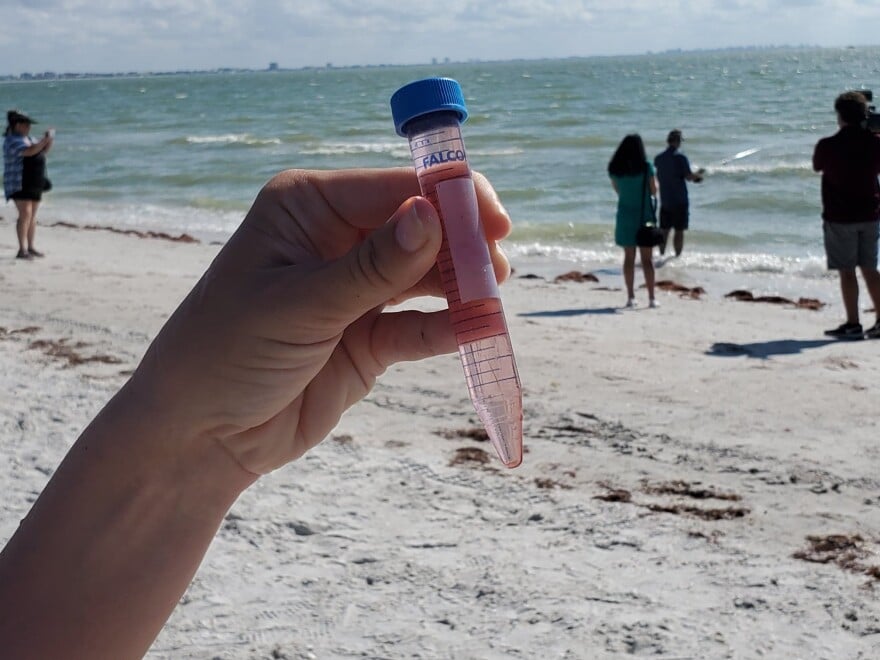Originally published in the Invading Sea by John Cassani, Calusa Waterkeeper Emeritus on July 1, 2024
Gov. Ron DeSantis vetoed the Safe Waterways Act, which was passed unanimously by the Florida Legislature
Florida public health policy took a blow recently when Gov. Ron DeSantis vetoed legislation aimed at reducing public risk from beach waters and public bathing places contaminated with fecal bacteria.
House Bill 165, known as the Safe Waterways Act, was passed unanimously by the Florida Legislature. The governor’s reason behind his veto was that the bill gave the Florida Department of Health (FDOH) the authority to close a beach when bacteria levels exceed safe thresholds, superseding “local jurisdictions.”
Residents and visitors alike often wonder why FDOH isn’t already the public agency that determines if a beach closure is necessary. And why would “local jurisdictions” – for example, local politicians, typically with no public health training or education – be the preferred authority to close a beach?
In fact, most beaches are on state waters where local jurisdictions are subject to state oversight. Other Florida water quality parameters have prevailing state jurisdiction where the Florida Department of Environmental Protection (FDEP) has received federally designated authority derived from the federal Clean Water Act.
FDEP currently has the authority, although rarely implemented, to restrict public access to a state water body when public health parameters, including fecal bacteria, exceed adopted thresholds. A documented sewage spill within a mile of a public bathing place would be one such example.
So why should “local jurisdictions” supersede FDOH, the agency vested with protecting the health of all Florida citizens?
State policy on posting signage related to health advisories is similarly convoluted. In fact, the majority of state waters, having recreation as a state-designated use, are not required to have on-site public signage indicating the risk from fecal bacteria contamination.
The Legislature has been able to avoid this politically awkward yet risky policy by focusing only on water designated and defined as a public bathing place.
A public bathing place is defined in the law as “a body of water, natural or modified by humans, for swimming, diving, and recreational bathing used by consent of the owner or owners and held out to the public by any person or public body, irrespective of whether a fee is charged for the use thereof.” Those public bathing places “include, but are not limited to, lakes, ponds, rivers, streams, artificial impoundments, and waters along the coastal and intracoastal beaches and shores of the state.”
On the surface, this policy would seem to include most public water body types involving recreation. But a careful reading of the policy indicates a significant narrowing of the definition requiring that eligible waters need to be “held out to the public by any person or public body.”
Unfortunately, the “held out” part has not been implemented more broadly by FDEP or FDOH as public bodies. The result is that the vast majority of recreational waters in Florida are not required to have onsite signs warning of contamination. This is startling news to many residents.
This outcome flies in the face of FDEP’s policies for restoring contaminated waters even if FDOH is not involved. The FDEP policy on bacteria contaminated water reads as follows: “The criteria are designed to protect primary contact recreation, including swimming, bathing, surfing, water skiing, tubing, water play by children, and similar water contact activities where a high degree of bodily contact with the water and immersion and ingestion are likely.”
There are two potential outcomes of this policy: to remedy the contamination by restoring the water to its unimpaired condition – a rare occurrence in Florida that could take decades – or to provide on-site notice to the public that the water body is risky and has been verified as impaired until restoration has been attained.
Sadly, neither outcome is likely, continuing a legacy of risk from contaminated waters. The time for reform is long overdue.
John Cassani is Calusa Waterkeeper emeritus.

























